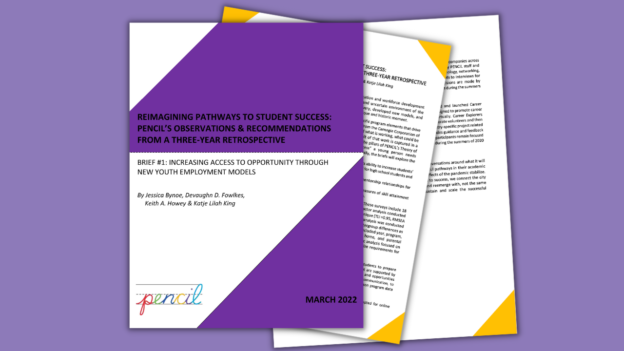Reimagining Pathways to Student Success

PENCIL is proud to release the first of three briefs in our new series:
Reimagining Pathways to Student Success: PENCIL’s Observations & Recommendations From a Three-Year Retrospective
By Jessica Bynoe, Devaughn D. Fowlkes, Keith A. Howey & Katje Lilah King
Over the past two years, youth serving non-profit organizations in the education and workforce development fields have needed to rapidly innovate, create, and adapt in the unstable and uncertain environment of the pandemic. Like our peer organizations, PENCIL shifted to virtual service delivery, developed new models, and refined programs to offer young people what they needed most during this unique and historic moment.
PENCIL also embraced this time to learn from our work and understand the specific program elements that drive desired outcomes in our efforts to “connect students to success.” With support from the Carnegie Corporation of New York, PENCIL conducted a three-year retrospective evaluation to understand what is working, what could be better, and what we can share to strengthen the field’s efforts overall. The result of that work is captured in a series of three briefs, each exploring a unique, data-driven hypothesis for one of the pillars of PENCIL’s Theory of Change. PENCIL’s Theory of Change asserts that to be “connected to success” a young person needs Developmental Relationships, Skill Attainment, and Access to Opportunity. Specifically, the briefs will explore the following topics:
– The difference between Career Explorers and all other PENCIL programs in its ability to increase students’ access to opportunity and sense of belonging. Notable trends were observed for high school students and first-generation college bound students.
– The difference between virtual and in person service delivery on building mentorship relationships for students especially for different age groups.
– The difference between school-year and summer program models on our measures of skill attainment and the potential for more developmentally scaffolded year-round approaches.
